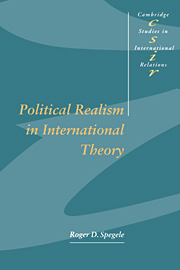Book contents
- Frontmatter
- Contents
- Preface
- Acknowledgements
- Part 1
- Part 2
- 4 Evaluative political realism: a beginning
- 5 State and state-systems in evaluative political realism
- 6 Evaluative political realism and human nature
- 7 Evaluative political realism and historical realism
- 8 Evaluative political realism as moral realism
- 9 Conclusion
- Notes
- Bibliography
- Index
- CAMBRIDGE STUDIES IN INTERNATIONAL RELATIONS
4 - Evaluative political realism: a beginning
from Part 2
Published online by Cambridge University Press: 30 October 2009
- Frontmatter
- Contents
- Preface
- Acknowledgements
- Part 1
- Part 2
- 4 Evaluative political realism: a beginning
- 5 State and state-systems in evaluative political realism
- 6 Evaluative political realism and human nature
- 7 Evaluative political realism and historical realism
- 8 Evaluative political realism as moral realism
- 9 Conclusion
- Notes
- Bibliography
- Index
- CAMBRIDGE STUDIES IN INTERNATIONAL RELATIONS
Summary
The beginning is more than half of the whole.
MachiavelliIntroduction
Having critically examined some other conceptions of international relations, I will now outline an alternative view, the one I've been calling ‘evaluative political realism’. In this chapter, I will first distinguish commonsense realism and concessional realism with the idea of indicating what evaluative political realism would like to appropriate from these views as it struggles to develop its own identity within the realist tradition. I will then go on to show that evaluative political realism is committed to a different conception of theory and practice than rival conceptions of international relations. Positivistempiricism's conception of theory and practice is one in which theory stands over against the world and the world, being outside the space of concepts, is unable to deliver justifiable judgements. This leads to scepticism. Recoiling from these sceptical entanglements and their adverse implications for social and political life, emancipatory international relations, especially in its postmodernist versions, tends to depict theory as involving engagements which have no empirical constraints associated with them at all: theory connects up with practice to avoid scepticism but falls into the clutches of frictionless utopianism. Evaluative political realism constitutes a third way. As against emancipatory international relations it holds, as commonsense suggests, that reality is independent of our thinking; but since our experience of that reality is a rational constraint on our thinking, this need not drive us back to the sceptical dichotomies found in positivist-empiricism.
- Type
- Chapter
- Information
- Political Realism in International Theory , pp. 83 - 101Publisher: Cambridge University PressPrint publication year: 1996



